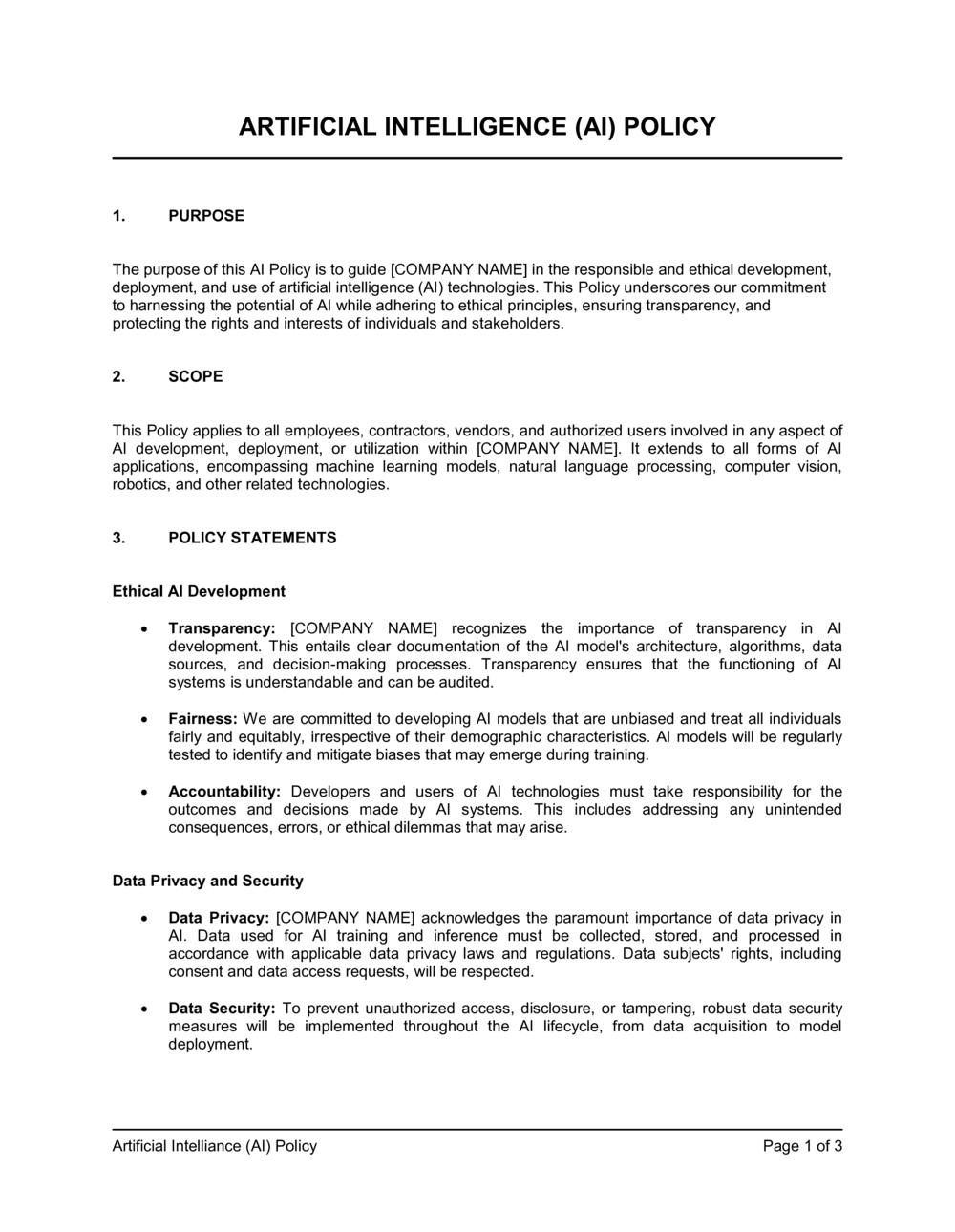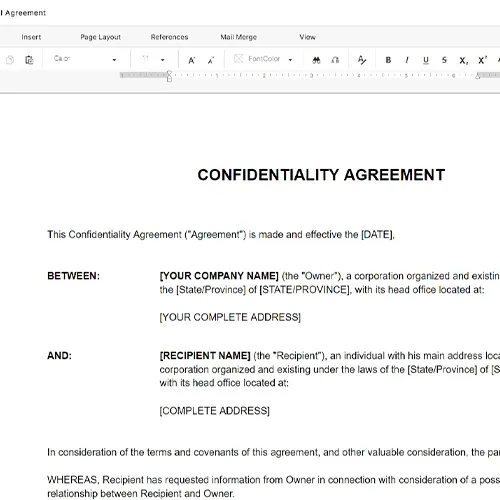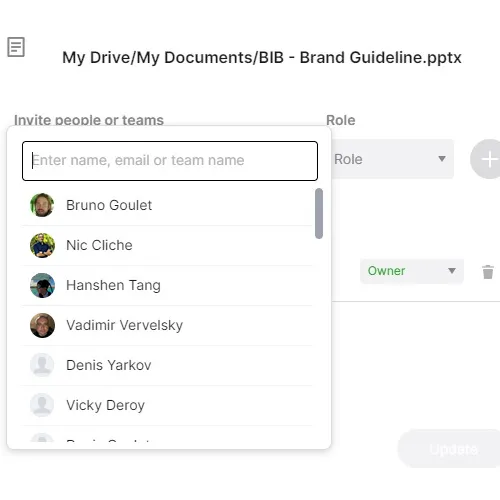AI Policy Template

Document content
This ai policy template has 3 pages and is a MS Word file type listed under our business plan kit documents.
Sample of our ai policy template:
ARTIFICIAL INTELLIGENCE (AI) POLICY PURPOSE The purpose of this AI Policy is to guide [COMPANY NAME] in the responsible and ethical development, deployment, and use of artificial intelligence (AI) technologies. This Policy underscores our commitment to harnessing the potential of AI while adhering to ethical principles, ensuring transparency, and protecting the rights and interests of individuals and stakeholders. SCOPE This Policy applies to all employees, contractors, vendors, and authorized users involved in any aspect of AI development, deployment, or utilization within [COMPANY NAME]. It extends to all forms of AI applications, encompassing machine learning models, natural language processing, computer vision, robotics, and other related technologies. POLICY STATEMENTS Ethical AI Development Transparency: [COMPANY NAME] recognizes the importance of transparency in AI development. This entails clear documentation of the AI model's architecture, algorithms, data sources, and decision-making processes. Transparency ensures that the functioning of AI systems is understandable and can be audited. Fairness: We are committed to developing AI models that are unbiased and treat all individuals fairly and equitably, irrespective of their demographic characteristics. AI models will be regularly tested to identify and mitigate biases that may emerge during training. Accountability: Developers and users of AI technologies must take responsibility for the outcomes and decisions made by AI systems. This includes addressing any unintended consequences, errors, or ethical dilemmas that may arise. Data Privacy and Security Data Privacy: [COMPANY NAME] acknowledges the paramount importance of data privacy in AI. Data used for AI training and inference must be collected, stored, and processed in accordance with applicable data privacy laws and regulations. Data subjects' rights, including consent and data access requests, will be respected. Data Security: To prevent unauthorized access, disclosure, or tampering, robust data security measures will be implemented throughout the AI lifecycle, from data acquisition to model deployment. AI Governance AI Governance Committee: [COMPANY NAME] will establish an AI Governance Committee comprised of multidisciplinary experts responsible for overseeing AI projects. The committee will provide guidance, conduct ethical assessments, and ensure that AI initiatives align with organizational values and ethical standards. Risk Assessment: All AI projects will undergo a comprehensive risk assessment before deployment. This assessment will encompass ethical, legal, and security considerations to identify and mitigate potential risks and ethical dilemmas. Oversight: Continuous monitoring and auditing mechanisms will be put in place to detect and respond to ethical or security issues promptly. This proactive approach aims to ensure that AI systems operate in compliance with ethical guidelines. Responsible AI Use Use Case Assessment: AI technologies will only be deployed for legitimate and ethical purposes
3,000+ Templates & Tools to Help You Start, Run & Grow Your Business

Document content
This ai policy template has 3 pages and is a MS Word file type listed under our business plan kit documents.
Sample of our ai policy template:
ARTIFICIAL INTELLIGENCE (AI) POLICY PURPOSE The purpose of this AI Policy is to guide [COMPANY NAME] in the responsible and ethical development, deployment, and use of artificial intelligence (AI) technologies. This Policy underscores our commitment to harnessing the potential of AI while adhering to ethical principles, ensuring transparency, and protecting the rights and interests of individuals and stakeholders. SCOPE This Policy applies to all employees, contractors, vendors, and authorized users involved in any aspect of AI development, deployment, or utilization within [COMPANY NAME]. It extends to all forms of AI applications, encompassing machine learning models, natural language processing, computer vision, robotics, and other related technologies. POLICY STATEMENTS Ethical AI Development Transparency: [COMPANY NAME] recognizes the importance of transparency in AI development. This entails clear documentation of the AI model's architecture, algorithms, data sources, and decision-making processes. Transparency ensures that the functioning of AI systems is understandable and can be audited. Fairness: We are committed to developing AI models that are unbiased and treat all individuals fairly and equitably, irrespective of their demographic characteristics. AI models will be regularly tested to identify and mitigate biases that may emerge during training. Accountability: Developers and users of AI technologies must take responsibility for the outcomes and decisions made by AI systems. This includes addressing any unintended consequences, errors, or ethical dilemmas that may arise. Data Privacy and Security Data Privacy: [COMPANY NAME] acknowledges the paramount importance of data privacy in AI. Data used for AI training and inference must be collected, stored, and processed in accordance with applicable data privacy laws and regulations. Data subjects' rights, including consent and data access requests, will be respected. Data Security: To prevent unauthorized access, disclosure, or tampering, robust data security measures will be implemented throughout the AI lifecycle, from data acquisition to model deployment. AI Governance AI Governance Committee: [COMPANY NAME] will establish an AI Governance Committee comprised of multidisciplinary experts responsible for overseeing AI projects. The committee will provide guidance, conduct ethical assessments, and ensure that AI initiatives align with organizational values and ethical standards. Risk Assessment: All AI projects will undergo a comprehensive risk assessment before deployment. This assessment will encompass ethical, legal, and security considerations to identify and mitigate potential risks and ethical dilemmas. Oversight: Continuous monitoring and auditing mechanisms will be put in place to detect and respond to ethical or security issues promptly. This proactive approach aims to ensure that AI systems operate in compliance with ethical guidelines. Responsible AI Use Use Case Assessment: AI technologies will only be deployed for legitimate and ethical purposes
Easily Create Any Business Document You Need in Minutes.

Access over 3,000+ business and legal templates for any business task, project or initiative.

Customize your ready-made business document template and save it in the cloud.

Share your files and folders with your team. Create a space of seamless collaboration.
Templates and Tools to Manage Every Aspect of Your Business.
Business in a Box Covers Every Business Department
Includes 16 Types of Business Documents You Need
and Achieve Your Business Goals Faster.
